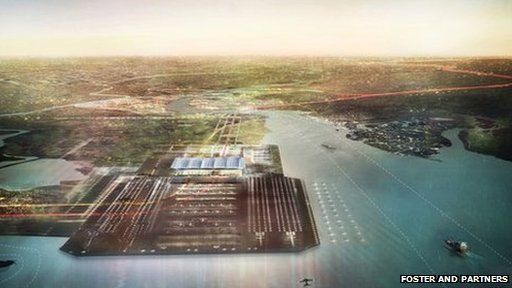Boris Johnson says airport plan not dead despite rejection
- Published
- comments

London Mayor Boris Johnson has said his proposal for an island airport in the Thames estuary is not dead, despite the Airports Commission rejecting the idea.
Commission chairman Sir Howard Davies said the huge cost, economic disruption and environmental concerns made the proposal unviable.
The mayor called this short-sighted, but said plans to expand either Gatwick or Heathrow airports would fail.
These plans face huge opposition and no government would back them, he claimed.
The proposal for a Thames Estuary airport - dubbed Boris Island because of the mayor's strong backing - would have led to the development of a four-runway airport on the Isle of Grain.
'Serious doubts'
But Sir Howard said in the commission's report: "We are not persuaded that a very large airport in the Thames estuary is the right answer to London's and the UK's connectivity needs.
"While we recognise the need for a hub airport, we believe this should be a part of an effective system of competing airports to meet the needs of a widely spread and diverse market like London's.
Boris Johnson: "This is all a gigantic smokescreen for a U-turn on Heathrow"
"There are serious doubts about the delivery and operation of a very large hub airport in the estuary.
"The economic disruption would be huge and there are environmental hurdles which it may prove impossible, or very time-consuming to surmount," Sir Howard said.
The least ambitious version of the island scheme would cost £70bn to £90bn, much more than other options, he said.
"The need for additional capacity is urgent. We need to focus on solutions which are deliverable, affordable, and set the right balance for the future," Sir Howard added.
The decision not to shortlist the Isle of Grain as an option leaves the commission with three choices: adding a third runway at Heathrow, lengthening an existing runway at Heathrow, and a new runway at Gatwick.
'Gathering dust'
Sir Howard's commission was set up by the government to consider ways of expanding airport capacity. The final report is expected next summer, after the general election.
Mr Johnson said: "In one myopic stroke, the Airports Commission has set the debate back by half a century and consigned their work to the long list of vertically filed reports on aviation expansion that are gathering dust on a shelf in Whitehall.
"Gatwick is not a long-term solution and [Sir] Howard Davies must explain to the people of London how he can possibly envisage that an expansion of Heathrow, which would create unbelievable levels of noise, blight and pollution, is a better idea than a new airport to the east of London that he himself admits is visionary, and which would create the jobs and growth this country needs to remain competitive."
Sir Howard Davies: "The risks and the costs of the Estuary project mean it's not something one should take forward"
However, Mr Johnson said that the island airport plans were not finished, despite the commission's announcement.
Proposals to expand either Heathrow and Gatwick would run into hurdles - as they had done in the past - and any future government would return to the Thames estuary plan.
That would make any future recommendation made by the Airports Commission "irrelevant", he said.
But Gatwick Airport chief executive Stewart Wingate said the commission's decision was the right one.
'Reducing noise'
"This is an important juncture in the aviation debate because now Britain's choice is clear; expand Gatwick and support genuine competition, lower fares and greater choice for passengers or expand Heathrow and return to the stale monopoly of the past and watch the cost of going on holiday, travelling for business and exporting goods and service go up," Mr Wingate said.
He said Gatwick's case for another runway offered the cheapest, quickest and most low risk solution to the urgent need to expand airport capacity.
However, Heathrow's chief executive John Holland-Kaye said his airport was now in pole position for expansion.
"We have always agreed with the mayor that Britain needs a successful hub airport to compete in the global race for jobs and growth. Heathrow is now the only hub left in the race," he said.
"We would like to work with the mayor to deliver Heathrow expansion in a way that benefits the whole country while reducing noise impacts for local people compared to today."
British Airways, the biggest operator at Heathrow, said: "We've always said that there was no economic case for a Thames estuary airport so it's no surprise that the Davies Commission, after a thorough investigation, has ruled it out."
- Published2 September 2014
- Published1 July 2015
- Published1 September 2014
- Published26 August 2014
- Published7 August 2013
- Published17 December 2013